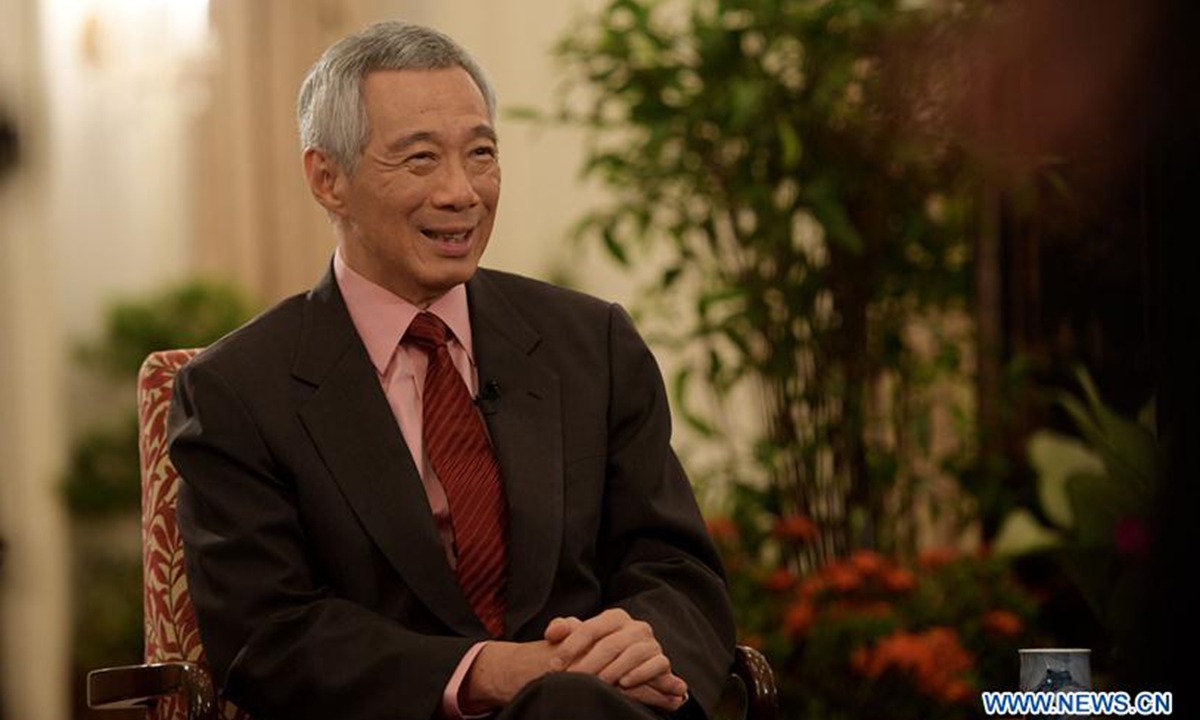
Singaporean Prime Minister Lee Hsien Loong receives an interview with Xinhua in Singapore in April 2019. Photo: Xinhua
Speaking at the virtual Aspen Security Forum Tuesday, Singapore Prime Minister Lee Hsien Loong noted that Chinese people may be wrong to believe that "the East is rising and the West is declining." He also warned Americans that "China is not going to disappear. This is not the Soviet Union." He stressed that a China-US conflict would be "disastrous for both sides, and the world."
Lee's comments represent the common view of a number of ASEAN nations, as well as the public, about the fierce contest between China and the US. Most of those countries would welcome or have no objection to a US presence and influence in the region as a counterweight to China. But they also fear a serious clash between the two great powers. None of them wants to be forced to take sides between China and the US.
It is a fact that the balance of power between China and the US, as well as their influence in the region, is changing. "The East is rising and the West is declining" is an obvious but slow trend, even though it hasn't reached a critical point where the geopolitical situation can be fundamentally reversed. Almost no Chinese believes that his or her country has the ability to engage in global strategic confrontation with the US, but our ability and confidence to defend our core interests in the Western Pacific region are being fully established. This is the Chinese people's authentic self-perception.
Most ASEAN members believe that the US is still stronger than China, which is true at the moment. But their assessment of the balance of power between the US and China, and their attitude to both countries, are quietly changing. When the Obama administration pursued the policy of strategic rebalance to the Asia Pacific region, most ASEAN members obviously tilted more toward the US and followed Washington closer than they are now. Now they have tilted back toward "neutral."
Take Singapore as an example. The country is one of the most dependent ASEAN members on the US in terms of politics and security. During the Obama administration, Singapore proactively cooperated with the US' South China Sea policy and added fuel to the fire of the South China Sea arbitration which was unilaterally initiated by former Philippine President Benigno Aquino III. In comparison to that time, Singapore's diplomatic language toward China and the US has become more balanced and smoother. This should be seen as a positive sign.
Previously, Southeast Asian countries relied on the US for politics and security, as well as economy. Now China has become the largest trade partner of almost all ASEAN members. China's investment to ASEAN is rapidly rising. Furthermore, China is also building its military power at a rapid pace. These combined are reshaping the power structure across the region.
The US said it is not asking Southeast Asian countries to choose between China and the US. But it also claimed that it wants to "present the countries of Southeast Asia with options." Washington is still trying to rope in ASEAN members to counter China. China objects to the US moves to strategically contain China in the region. Our goal is to make Southeast Asian countries remain truly neutral between China and the US, and this attempt is righteous.
China still has a long way to go before its comprehensive strength overtakes that of the US. This has not even become part of China's serious strategic plan. We are aware that there is still a big gap between the two countries in science and technology as well as military power. We do not have the ambition to engage in a life-or-death strategic confrontation with the US, or disrupt the country.
But China will certainly do its best to build an edge over the US in the Western Pacific region, including in the field of military. This advantage will ensure the US does not launch an aggressive challenge in China's adjacent waters. It will also make sure that regional countries will not support the US' containment of China that gravely impairs China's national interests.
This is not an excessive goal; it is the dignity and right of China as a great power. The US cannot always squeeze China on China's doorstep, and countries in the region should not seek particular interests by taking advantage of the US' extreme China policy. In this process, a balance should be reached to best fit the legitimate interests of all parties.
In his speech, Lee noticed the sensitivity of the Taiwan question as well. The Taiwan question cannot be permanently delayed this way. This is because the reunification is an essential part of China's rejuvenation, and this question is now persisting in a way that severely damages China's national interests and consumes China's diplomatic resources. If Taiwan authorities do not take the initiative to reduce the damage to the interests of the Chinese nation caused by the status quo across the Taiwan Straits, they must prepare for a storm. When that day will come is only a matter of time.

